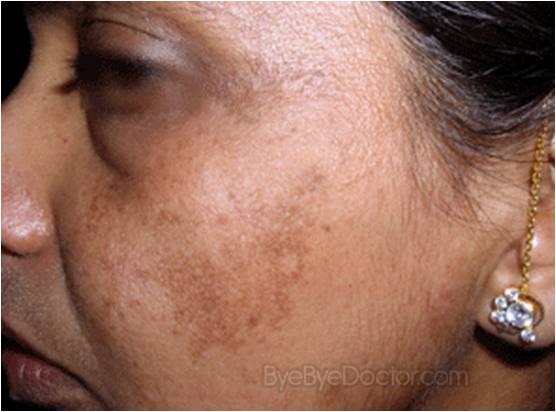Skin pigmentation/Melasma
What is pigmentation?
 Skin Pigmentation/Melasma presents as brown/black patches on the face especially on the cheeks, bridge of nose, forehead, and upper lips.
Skin Pigmentation/Melasma presents as brown/black patches on the face especially on the cheeks, bridge of nose, forehead, and upper lips.
Causes & predisposing factors?
- The exact cause of melasma is unknown.
- Melasma mostly occurs in women (90%). Though it can also occur in men.
- It may be due to the stimulation of melanocytes or pigment-producing cells by the female sex hormones estrogen and progesterone, to produce more melanin pigment when the skin is exposed to sun.
- Women with brown skin type, living in areas with intense sunlight are more likely to develop this condition.
- Dark-skinned people like Indians are likely to have melasma more than others.
- People with a family history of melasma are more likely to develop melasma.
- It is commonly seen in pregnancy and called chloasma.
- Birth control pills may also cause melasma.
- Sun exposure contributes to melasma.
How is it diagnosed?
Most patients can be diagnosed simply by a skin examination. Occasionally a skin biopsy is required.
How is pigmentation treated?
- Management of melasma requires a comprehensive approach by a dermatologist. Avoidance of sun exposure and irritants, use of broad spectrum sunscreens, application of bleaching agents, and close supervision by your dermatologist will give you a successful outcome.
- Any facial cleansers, creams, or make-up which irritates the skin should be stopped, as this may worsen the melasma
- Usually creams containing Tretinoin and Glycolic Acid are used in combination with hydroquinone to treat melasma.
- Tretinoin MUST NOT be used in pregnancy.
- A sunscreen should be applied daily in addition to bleaching cream as advised.
- Chemical peels (single or combination peels) and laser surgery (Q-switched NG-YAG Laser) may help in treatment of melasma. Generally, they are used in combination with bleaching creams and other topical applications depending on your skin type. Melasma should be treated under the supervision of an experienced dermatologist because complications can occur.
- It is important to follow the directions of our dermatologist carefully to get best results and to avoid side effects.
Skin Clinic
Working Time
- Mon-Sat
9.30 AM - 1.30 PM
5.30 PM - 8.00 PM
Saturday
9.30 AM - 1.30 PM
Contact Info
-
Phone: 9810030327
9560400327 - bindalclinic@gmail.com
